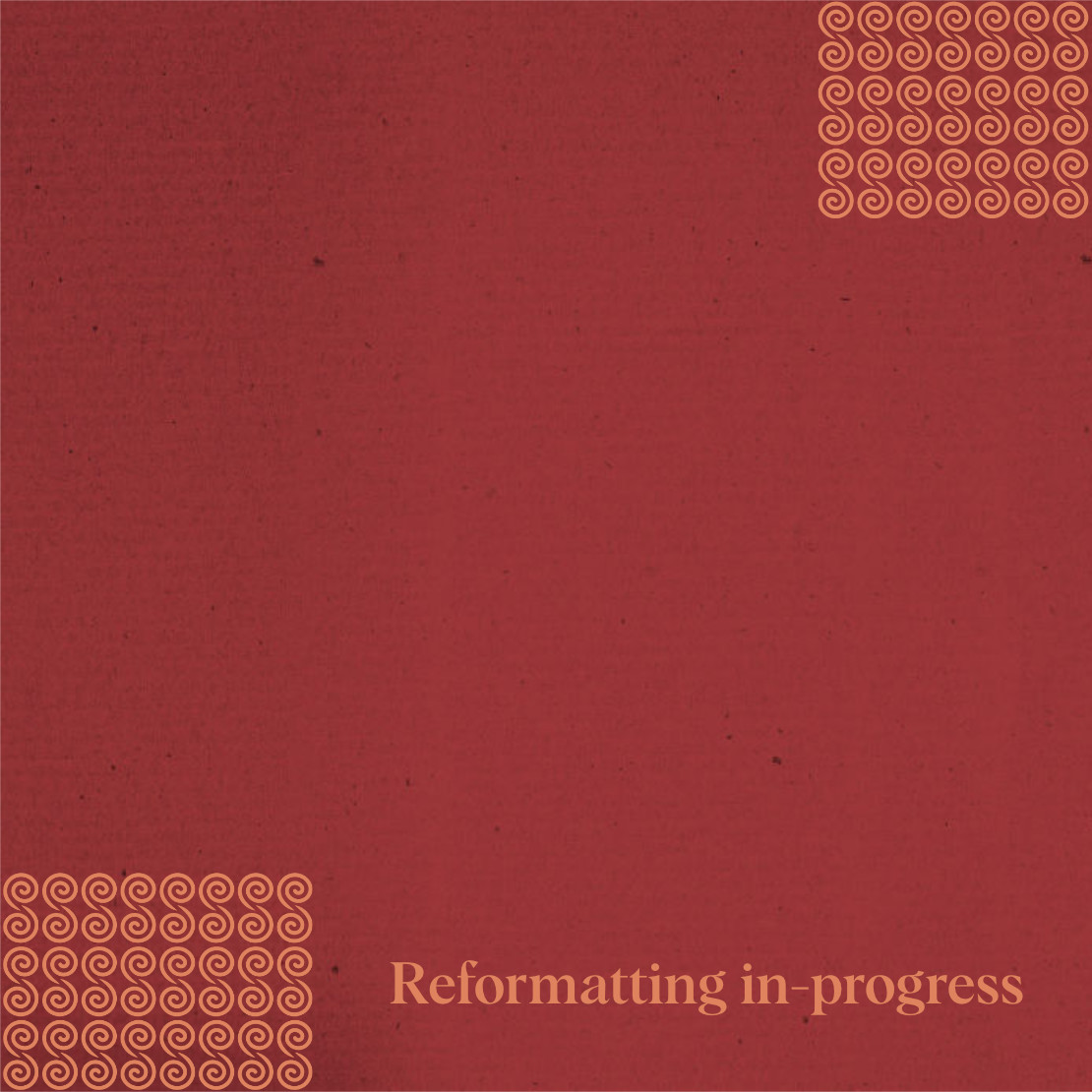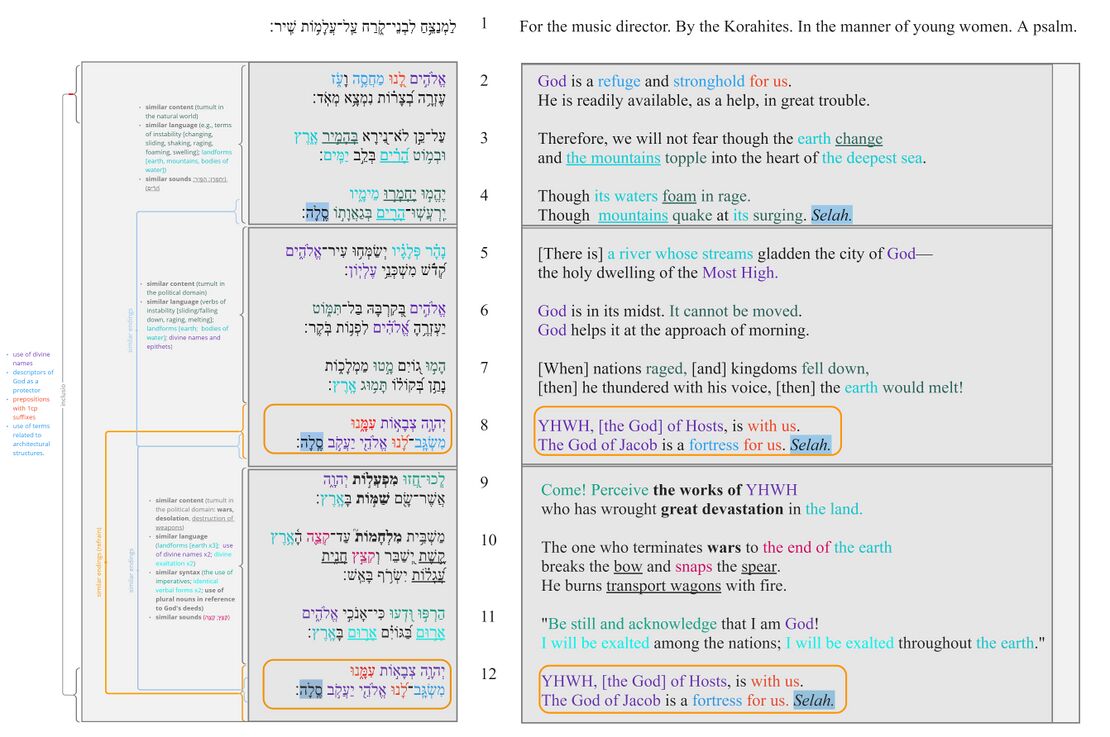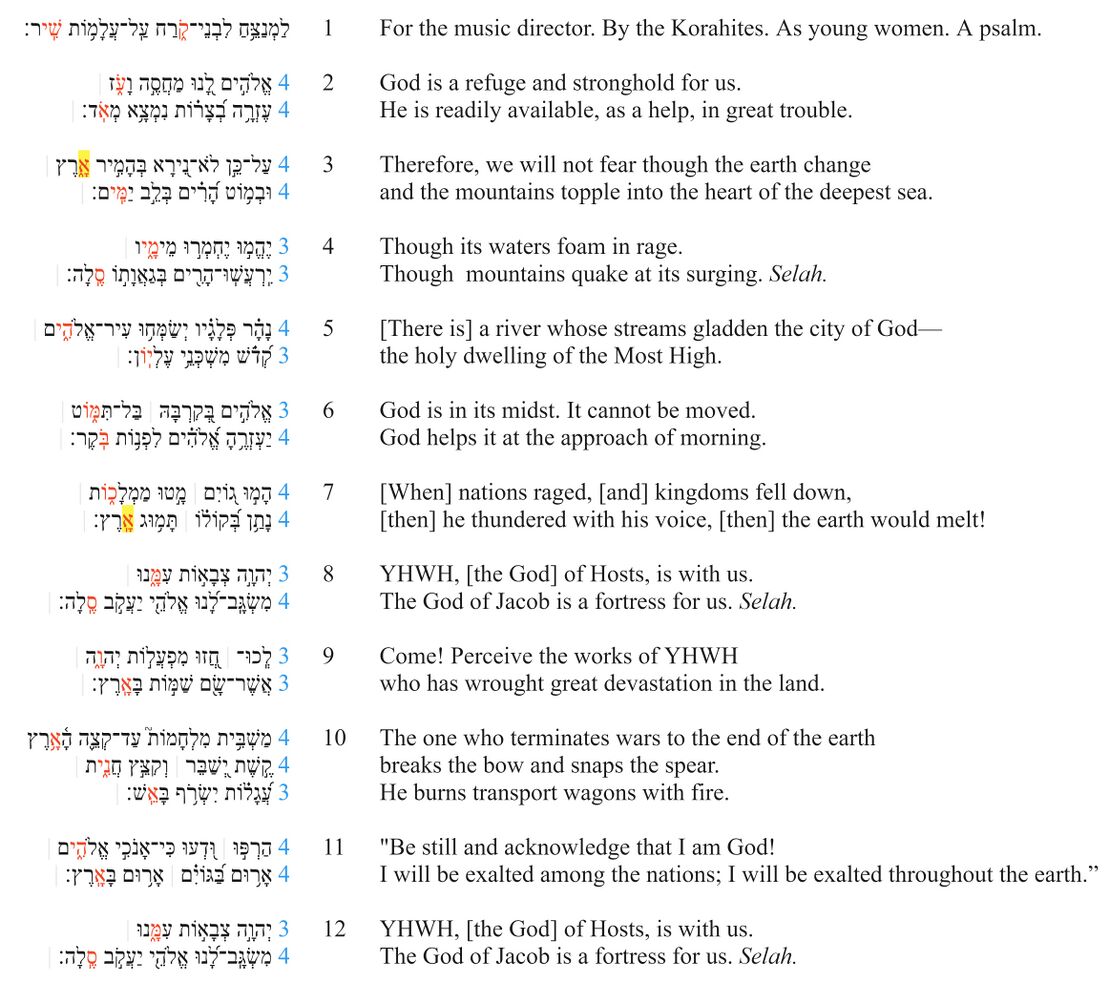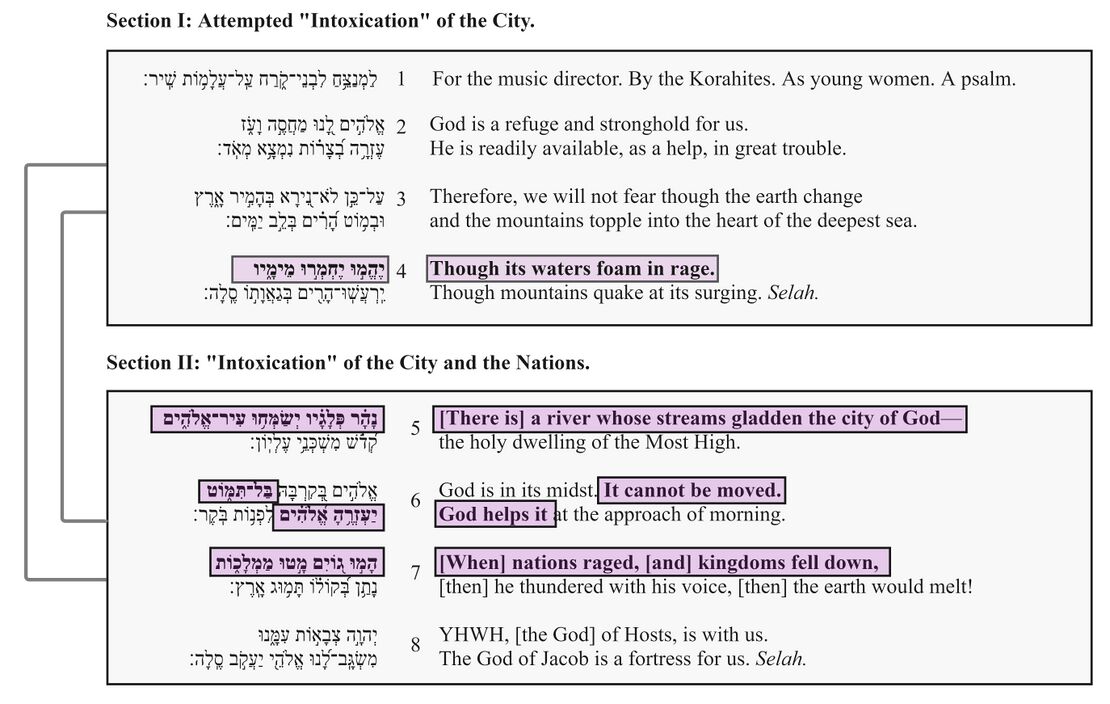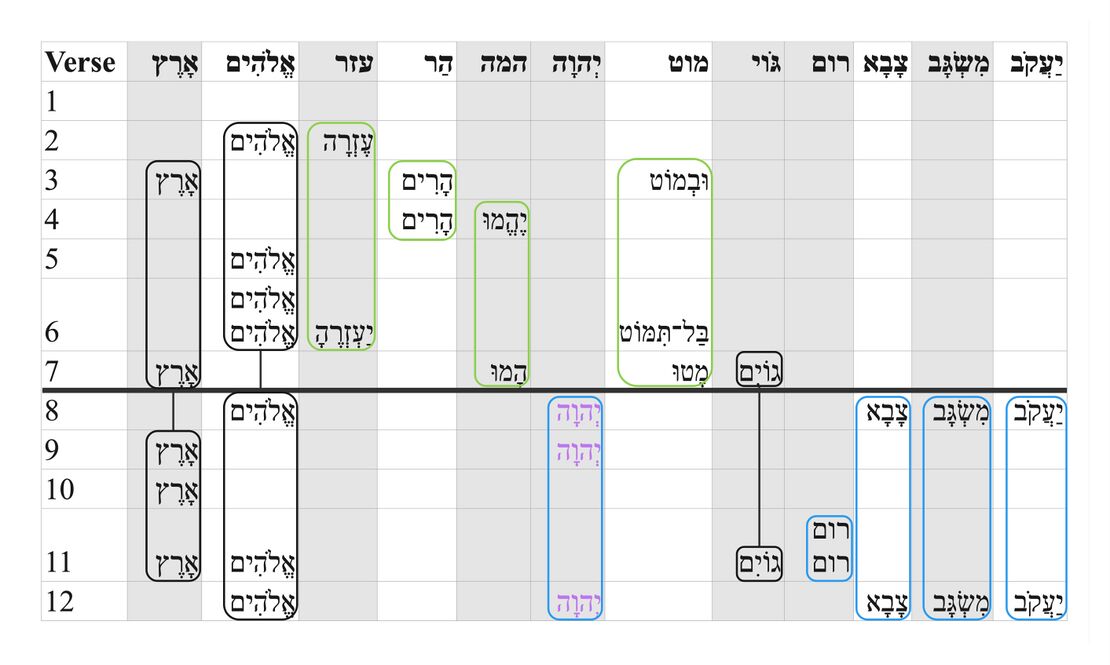Psalm 46 Poetry
About the Poetics Layer
Exploring the Psalms as poetry is crucial for understanding and experiencing the psalms and thus for faithfully translating them into another language. This layer is comprised of two main parts: Poetic Structure and Poetic Features.
Poetic Structure
In poetic structure, we analyse the structure of the psalm beginning at the most basic level of the structure: the line (also known as the “colon” or “hemistich”). Then, based on the perception of patterned similarities (and on the assumption that the whole psalm is structured hierarchically), we argue for the grouping of lines into verses, verses into strophes, strophes into stanzas, etc. Because patterned similarities might be of various kinds (syntactic, semantic, pragmatic, sonic) the analysis of poetic structure draws on all of the previous layers (especially the Discourse layer).
Poetic Features
Bibliography
- Abernethy, Andrew T. 2019. "‘Mountains Moved into the Sea’: The Western Reception of Psalm 46:1 and 3 [45:1 and 3 LXX] From the Septuagint to Luther." The Journal of Theological Studies 70: 523–545.
- Aikhenvald, Alexandra Y. 2018. Serial Verbs. Oxford: Oxford University Press.
- Anderson, Arnold Albert. 1981. The Book of Psalms: Based on the Revised Standard Version. Grand Rapids, MI: Eerdmans.
- Bach, Robert. 1971. “... Der Bogen zerbricht, Spiesse zerschlägt und Wagen mit Feuer verbrennt.” Pages 13–26 in Probleme biblischer Theologie. Edited by Hans Walter Wolff. Munich: Kaisere.
- Bachvarova, M. 2008. "Sumerian Gala Priests and Eastern Mediterranean Returning Gods: Tragic Lamentation in Cross-Cultural Perspective." Pages 18–52 in Lament: Studies in the Ancient Mediterranean and Beyond. Edited by Ann Suter. Oxford: Oxford University Press.
- Briggs, Charles Augustus and Emilie Grace Briggs. 1907. A Critical and Exegetical Commentary on the Book of Psalms. Vol. 2. ICC. Edinburgh: T&T Clark.
- Cornell, Collin. 2020. Divine Aggression in Psalms and Inscriptions: Vengeful Gods and Loyal Kings. SOTSM. Cambridge: Cambridge University Press.
- Craigie, Peter C., and Marvin E. Tate. 1983. Psalms 1–50. 2nd ed. WBC 19. Grand Rapids, MI: Zondervan.
- Creach, Jerome F.D. 1996. Yahweh as Refuge and the Editing of the Hebrew Psalter. JSOTSup 217. Sheffield: Sheffield Academic Press.
- Dahood, Mitchell. 1966. Psalms. Vol. 1. AB. New York: Doubleday.
- Day, P. 1995. "The Personification of Cities in the Hebrew Bible: The Thesis of Aloysius Fitsgerald, F.S.C.," Pages 283-302 in Reading From This Place: Social Location and Biblical Interpretation. Edited by Fernando Segovia and Mary Ann Tolbert. Minneapolis: Fortress.
- Day, John. 1985. God’s Conflict with the Dragon and the Sea: Echoes of a Canaanite Myth in the Old Testament. Cambridge: Cambridge University Press.
- DeClaissé-Walford, Nancy, Rolf A. Jacobson, and Beth LaNeel Tanner. 2014. The Book of Psalms. NICOT. Grand Rapids, MI: Eerdmans.
- Delitzsch, Franz. 1883. Biblical Commentary on the Psalms. vol. 1. Translated by Eaton David. New York: Funk and Wagnalls.
- Dobbs-Allsopp, F. 1993. Weep, O Daughter of Zion: A Study of the City-Lament Genre in the Hebrew Bible. Rome: Editrice Pontificio Istituto Biblico.
- Duhm, Bernhard. 1922. Die Psalmen. 2nd ed. Kurzer Hand-Commentar Zum Alten Testament 14. Tübingen: Mohn (Paul Siebeck).
- Fokkelman, J.P. 2000. Major Poems of the Hebrew Bible: At the Interface of Prosody and Structural Analysis (Vol 2: 85 Psalms and Job 4–14). Studia Semitica Neerlandica. Assen, Drenthe: Van Gorcum.
- Futato, Mark D. 2007. Interpreting the Psalms. Grand Rapids, MI: Kregel.
- Goldingay, John. 2007. Psalms 42–89. Baker Commentary on the Old Testament. Grand Rapids, MI: Baker Academic.
- Goulder, Michael D. 1982. The Psalms of the Sons of Korah. Sheffield: JSOT Press.
- Grayson. Kirk A. and Jamie Novotny. 2014. The Royal Inscriptions of Sennacherib, King of Assyria (704–681 BC). University Park, PA: University of Pennsylvania Press, Eisenbrauns.
- Gunkel, Hermann. 1895. Schopfung und Chaos in Urzeit und Endzeit. Göttingen: Vandenhoeck und Ruprecht.
- ________. 1968. Die Psalmen. HK II.2. Göttingen.
- Gwaltney, W. 1983. "The Biblical Book of Lamentations in the Context of Near Eastern Lament Literature." Pages 191–212 in More Essays on the Comparative Method: Scripture in Context II. Winona Lake, IN: Eisenbrauns.
- Hayes, John. 1963. “The Tradition of Zion’s Inviolability.” Journal of Biblical Literature 82, no. 4: 419-426.
- Hengstenberg, Ernst Wilhelm. 1863. Commentary on the Psalms. Vol. 2. Edinburgh: T&T Clark.
- Hossfeld, Frank-Lothar, and Erich Zenger. 1993. Die Psalmen I. Neue Echter Bibel. Würzburg: Echter.
- Jenni, Ernst. 2012. "Nif’al und Hitpa‘el im Biblisch-Hebräischen." Pages 131-304 in Studien zur Sprachwelt des Alten Testaments III. Stuttgart: Kohlhammer.
- Jacobson, Rolf. A. 2020. "Psalm 46: Translation, Structure, and Theology." Word and World 40: 308-320.
- Junker, H. 1962. "Der Strom, dessen Arme die Stadt Gottes erfreuen (Ps. 46,5)." Biblica 43: 197-201.
- Keel, Othmar. 1997. The Symbolism of the Biblical World: Ancient Near Eastern Iconography and the Book of Psalms. Translated by T.J. Hallett. Winona Lake, IN: Eisenbrauns.
- Kissane, Edward. 1953. The Book of Psalms. Vol. 1. Westminster, MD: The Newman Press.
- Klingbeil, Martin. 1999. Yahweh Fighting from Heaven. God as Warrior and as God of Heaven in the Hebrew Psalter and Ancient Near Eastern Iconography. OBO 169. Göttingen: Vandenhoeck & Ruprecht.
- Kolyada, Yelena. 2009. A Compendium of Musical Instruments and Instrumental Terminology in the Bible. Bible World. London: Equinox.
- Kraus, Hans-Joachim. 1972. Psalmen 1–63. BKT XV/1. Neukirchen-Vluyn: Neukirchener Verlag.
- Linguistic Inquiry and Word Count Program: http://www.liwc.net/
- Loretz, Oswald. 1979. Die Psalmen: Beitrag der Ugarit-Texte zum Verständnis von Kolometrie und Textologie der Psalmen. Neukirchen-Vluyn: Neukirchener Verlag.
- L., S.H. 1916. "An Ancient Babylonian Map." The Museum Journal VII, 4: 263-268. Accessed August 22, 2024. https://www.penn.museum/sites/journal/530/
- Lugt, Pieter van der. 2010. Cantos and Strophes in Biblical Hebrew Poetry. Vol. 2. Oudtestamentische Studiën 53. Leiden: Brill.
- Lunn, Nicholas P. 2006. Word Order Variation in Biblical Hebrew Poetry: The Role of Pragmatics and Poetics in the Verbal Clause. Paternoster Biblical Monographs. Milton Keynes: Paternoster.
- Maier, Christl. 2008. Daughter Zion, Mother Zion: Gender, Space, and the Sacred in Ancient Israel. Minneapolis, MI: Fortress Press.
- Mena, Andrea K. 2012. The Semantic Potential of in Genesis, Psalms, and Chronicles. MA thesis, Stellenbosch University.
- Miller, P.D. 1973. The Divine Warrior in Early Israel. HSM 5. Cambridge: Harvard University Press.
- Miller, Robert D. 2010. “The Zion Hymns as Instruments of Power.” Ancient Near Eastern Studies 47: 217–39.
- ________. 2018. The Dragon, the Mountain, and the Nations: An Old Testament Myth, Its Origins, and Its Afterlives. Explorations in Ancient Near Eastern Civilizations. Winona Lake, IN: Eisenbrauns.
- Neve, Lloyd. 1974/75. "The Common Use of Traditions by the Author of Psalm 46 and Isaiah." The Expository Times 86: 243-246.
- O’Kelly, Matthew A. 2024. "Stillness and Salvation: Reading Psalm 46 in Its Context." Journal for the Study of the Old Testament 48: 371–383.
- Peterson, Eugene H. 2003. The Message. Colorado Springs, CO: NavPress.
- Raabe, P.R. 1990. Psalm Structures. A Study of Psalms with Refrains. Journal for the Study of the Old Testament Supplement Series 104. Sheffield: JSOT Press.
- RINAP: Royal Inscriptions of the Neo-Assyrian Period (RINAP) Project
- Quine, Cat. 2020. Casting Down the Host of Heaven: The Rhetoric of Ritual Failure in the Polemic Against the Host of Heaven. Old Testament Studies 78. Leiden: Brill.
- Sawyer, John F.A. 2011. “The Terminology of the Psalm Headings.” Pages 288-298 in Sacred Text and Sacred Meanings: Studies in Biblical Language and Literature. Collected Essays by John F.A. Sawyer. Sheffield: Sheffield Phoenix.
- Schroer, Sylvia. 2008. "Gender and Iconography from the Viewpoint of a Feminist Biblical Scholar." Lectio Deficilio 2: 1-25.
- Trimm, Charlie. 2017. Fighting for the King and the Gods: A Survey of Warfare in the Ancient Near East. Resources for Biblical Studies 88. Atlanta, GA: Society of Biblical Literature Press.
- Tsumura, David Toshio. 1980. “The Literary Structure of Psalm 46, 2-8.” Annual of the Japanese Biblical Institute 6: 29-55.
- ________. 1981. "Twofold Image of Wine in Psalm 46:4-5." Jewish Quarterly Review 71: 167-175.
- ________. 2014. Creation and Destruction: A Reappraisal of the Chaoskampf Theory in the Old Testament. Winona Lake, IN: Eisenbrauns.
- Waltke, Bruce K., James M. Houston and Erika Moore. The Psalms as Christian Worship: A Historical Commentary. Grand Rapids, MI: Eerdmans, 2010.
- Watson, Rebecca S. 2005. Chaos Uncreated: A Reassessment of the Theme of “Chaos” in the Hebrew Bible. Beihefte zur Zeitschrift für die alttestamentliche Wissenschaft 341. Berlin: de Gruyter.
- ________. 2018. “'Therefore We Will Not Fear”? The Psalms of Zion in Psychological Perspective." Pages 182-216 in The City in the Hebrew Bible: Critical, Literary and Exegetical Approaches. Edited by James K. Aitken and Hilary F. Marlow. LHBOTS 672. London: T&T Clark.
- Weber, B. 2001 and 2003. Werkbuch Psalmen. 2 vols. Stuttgart: Kohlhammer.
- Weiser, Artur. 1962. The Psalms. OTL. Translated by Herbert Hartwell. Philadelphia, PA: Westminster Press.
- Welton, Rebekah. 2024. "Yahweh the Wrathful Vintner: Blood and Wine-making Metaphors in Isaiah 49:26a and 63:6." Journal for Interdisciplinary Biblical Studies 4: 19-41.
- Wilson, Gerald. 2002. Psalms. Vol. 1. NIV Application Commentary. Grand Rapids: Zondervan.
- Wright, Jacob. 2015. “Urbicide: The Ritualized Killing of Cities in the Ancient Near East.” Pages 147-166 in Ritual Violence in the Hebrew Bible: New Perspective. Edited by Saul M. Olyan. Oxford: Oxford University Press.
- Ziegler, Joseph. 1950. “Die Hilfe Gottes ‘am Morgen.’” Pages 281–88 in Alttestamentliche Studien. Edited by Hubert Junker and Johannes Botterweck. Bonn: Hanstein.
